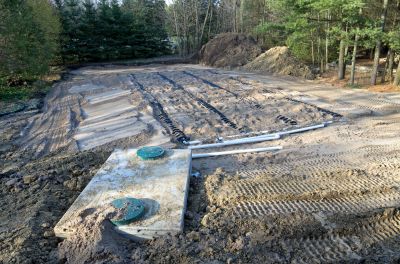Expert Picks for Leach Field Repair Equipment and Supplies
A curated selection of high-quality products that help repair specialists deliver durable and long-lasting leach field solutions.
 Leach field repair products are essential tools and materials designed to maintain and restore the function of septic drain fields. Properly functioning leach fields are vital for effective wastewater management, preventing system failures, and avoiding costly repairs. When issues such as clogging, soil compaction, or broken pipes arise, having the right repair products can help address these problems efficiently. These products range from chemical treatments that help clear blockages to physical repair kits that enable replacement of damaged pipes and components.
Leach field repair products are essential tools and materials designed to maintain and restore the function of septic drain fields. Properly functioning leach fields are vital for effective wastewater management, preventing system failures, and avoiding costly repairs. When issues such as clogging, soil compaction, or broken pipes arise, having the right repair products can help address these problems efficiently. These products range from chemical treatments that help clear blockages to physical repair kits that enable replacement of damaged pipes and components.
Top Overall Option
Leach Field Repair Kit
A versatile leach field repair kit that includes pipe segments, fittings, sealants, and tools designed for various repair scenarios. It offers a comprehensive solution for replacing damaged pipes, sealing leaks, and restoring proper flow. Suitable for both professional and DIY use, this kit provides the essential components needed to address common leach field issues effectively.
Types of Products For Leach Field Repair Service
Pipe Replacement Segments
Pre-cut pipe sections designed for quick replacement of damaged or collapsed pipes within the leach field.
Sealing Fittings and Couplings
Specialized fittings and couplings to secure pipe connections and prevent leaks or disconnections.
Leak Sealants and Pipe Repair Tape
Chemical sealants and tapes formulated to seal leaks and cracks in pipes and fittings.
Soil Aeration Tools
Tools designed to aerate and loosen soil around the leach field, improving drainage and soil health.
Inspection Ports and Clean-outs
Access points that allow for inspection, maintenance, and cleaning of the septic system components.
Drain Field Soil Conditioning Products
Additives that enhance soil permeability and prevent compaction issues in the drain field.
Root Barrier and Control Products
Materials designed to prevent tree roots from infiltrating and damaging leach field pipes.
Heavy-duty Pipe Supports and Anchors
Supports and anchors to stabilize pipes and prevent movement or damage during repairs.
Drain Field Reseeding and Cover Materials
Materials to reseed or cover the repair area after work is completed, promoting healthy soil and grass growth.
Portable Pump and Drainage Equipment
Tools for removing excess water or sludge from the leach field area during repairs.
Popular Choices
Biological additives designed to promote natural breakdown of organic matter in the leach field.
Reusable sleeves that provide a quick fix for leaking or cracked pipes in the drain field.
Cameras that allow detailed inspection of pipes and soil within the leach field to identify issues.
Portable pumps used to aerate the soil and improve drainage in the drain field area.
Dye kits that help locate leaks or cracks in septic pipes and fittings.
Clamps used to secure pipe joints and prevent leaks during repairs.
Specialized soil mixes that improve permeability and support healthy grass growth over the leach field.
Tools used to compact soil after repairs, ensuring stability and proper drainage.
Complete kits for inspecting and diagnosing issues in the septic and drain field system.
Tools designed for reseeding and restoring grass over the repaired drain field area.
Choosing appropriate products for leach field repair depends on the specific nature of the problem, the size of the system, and the extent of damage. For minor clogs or buildup, enzymatic or bacterial additives can promote natural breakdown of organic matter, helping to restore flow. For more significant issues, repair kits that include pipe segments, fittings, and sealants are necessary to replace broken or collapsed pipes. Additionally, soil conditioning products can improve soil permeability, ensuring proper wastewater dispersal.
Regular maintenance products also play a role in preventing future issues. These include inspection ports, clean-out fittings, and soil aeration tools that can be used periodically to keep the system in good working order. It is important to select products compatible with existing septic systems and to follow manufacturer instructions carefully. Consulting with a professional can help determine the most suitable solutions for specific leach field problems, ensuring safety and effectiveness.
Overall, having a comprehensive set of repair products and maintenance supplies can help homeowners and service providers manage leach field health proactively. Proper use of these products can extend the lifespan of septic systems, reduce the risk of failure, and maintain environmental safety. Investing in quality repair materials and understanding their applications is a practical step toward ensuring reliable wastewater management.
Key Buying Considerations
- Compatibility with existing septic system components and piping.
- Extent of damage or blockage in the leach field to determine necessary repair products.
- Ease of use, especially for DIY repairs or for professional contractors.
- Material durability and resistance to soil and moisture conditions.
- Availability of repair kits that include all necessary components for a comprehensive fix.
- Chemical compatibility and safety when using additives or sealants.
- Soil conditions and whether soil conditioning or aeration products are needed.
- Environmental safety and non-toxicity of repair materials.
- Cost-effectiveness and value for the scope of repair work.
- Manufacturer instructions and support for proper application.
- Product reviews and ratings to gauge reliability and effectiveness.
- Local regulations or codes that may influence product selection.
- Potential need for professional consultation or inspection services.
- Frequency of maintenance products to help prevent future issues.
- Availability of replacement parts and accessories for ongoing repairs.
